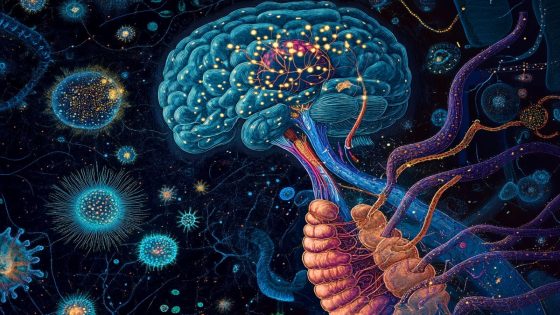A groundbreaking study has revealed how the gut microbiome regulates brain signals through the vagus nerve. Conducted in February 2025, this research uncovers the intricate communication between our gut and brain, raising questions about how our diet impacts mental health. Could the bacteria in our intestines hold the key to better brain function?
- Gut microbiome communicates via vagus nerve
- Germ-free mice show reduced vagal activity
- Antibiotics decrease vagal activity in normal mice
- Short-chain fatty acids activate vagus nerve
- Gut-brain axis may inform new treatments
- Research led by Kelly G. Jameson
Understanding the Gut Microbiome’s Role in Brain Communication
How does what we eat influence our brain health? Recent findings indicate that the gut microbiome plays a crucial role in brain signaling through the vagus nerve. This connection sheds light on the potential for dietary changes to improve mental health and manage neurological disorders.
The Vagus Nerve: A Pathway for Gut-Brain Communication
The vagus nerve serves as a highway for signals between the gut and brain. Researchers found that germ-free mice had reduced vagal activity, which increased when gut bacteria were introduced. This suggests that a healthy microbiome is essential for optimal brain function.
- Gut bacteria influence vagus nerve activity.
- Short-chain fatty acids and bile acids activate vagal neurons.
- Restoring gut bacteria can enhance brain communication.
- Understanding this link may lead to new treatments for disorders.
Key Findings on Gut Microbiome and Vagal Activity
In the study, scientists used antibiotics to eliminate gut bacteria in normal mice, resulting in decreased vagal activity. Remarkably, when they reintroduced microbiome-derived fluids, the vagal activity returned to normal levels. This highlights the essential role of gut bacteria in maintaining healthy brain communication.
Potential Implications for Neurological Health
These findings open the door to new treatment possibilities. By understanding how gut microbiota influences the vagus nerve, researchers can explore innovative therapies for neurological and gastrointestinal disorders. This connection could revolutionize how we approach mental health and overall wellness.
In conclusion, the relationship between the gut microbiome and brain signals is a promising area of research. As we learn more about this connection, we may find new ways to enhance mental health through dietary and lifestyle changes.

































